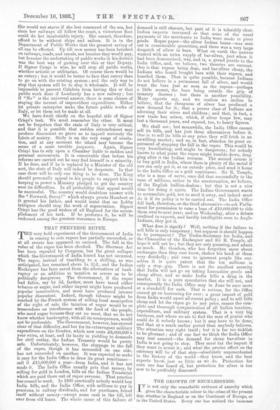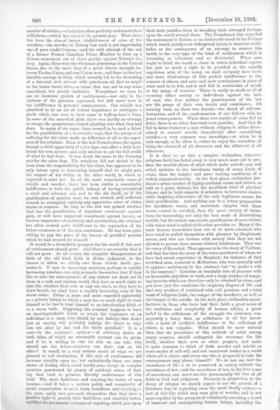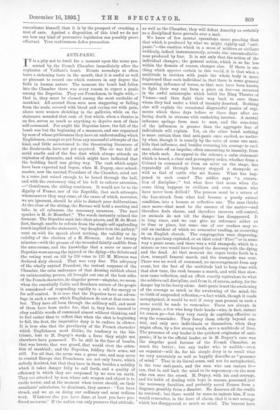THE GROWTH OF RECKLESSNESS.
IF is not only the remarkable outburst of anarchy which gives the characteristic colour to the crime of the present day, whether in England or on the Continent of Europe, or in the United States. Every one has noticed the immense number of suicides,—of suicides often perfectly reckless in their wilfu]ness,—which has marked the present year. Then there has been the almost insane vindictiveness of some of the murders,—the murder at Henley last week is not improbably one of pure vindictiveness,—and the wild attempt of the son of a former French Canadian Prime Minister to blow up a Nelson monument out of sheer grudge against Nelson's vic- tory. Again, there were the wholesale poisonings in the United States, due to the mere fury of a great labour struggle be- tween Trades-Union and non-Union men ; and there is this last horrible outrage in Italy, which actually led to the drenching of a detested civil servant with petroleum oil, that he might be the better burnt alive,—a crime that was not in any sense anarchical, but purely vindictive. Everywhere we seem to see an immense growth of reoklessness,—not only in the violence of the passions expressed, but still more even in the indifference to personal consequences. One suicide was admitted to be an act of violent impatience to anticipate a death which was sure to have come in half-an-hour's time. In some of the anarchist plots there was hardly an attempt to escape, the perpetrators almost gloating over what they had done. In many of the cases, there seemed to be such a thirst for the gratification of a destructive rage, that the prospect of suffering for the crime made no difference at all to the eager- ness of the criminal. Even in the last French crime, the agent, though a thief apparently of a low type, was after a little hesi- tation his own accuser, and only anxious to get the full credit of what he had done. It was much the same in the Grimsby murder the other days The murderer did not shrink in the least from the responsibility for his crime, but appeared to be only intent upon so demeaning himself that he might gain the respect of his victim in the other world, in which be expected to meet her. In all the more remarkable cases of suicide and murder, there has been visible a remarkable indifference to both the public infamy of having committed a cruel and criminal act, and to the sin itself, as if the gratification of passion were its own reward, and sufficient reward to extinguish entirely any oppressive sense of either shame or remorse. So long as the end was gained, whether that was the gratification of impatient resentment against pain, or still more impatient resentment against luxury, or furious impatience of authority and martinetism, the criminal has often seemed quite indifferent to the reproaches of his fellow-creatures or of his own conscience. He has been quite willing to pay the price of the luxury of gratified passion which he had secured for himself.
It would be a formidable prospect for the world if this sort of recklessness should grow. And there is no security that it will not grow. At all events, the complete disappearance of faith of the old kind, faith in divine judgment, in the classes to which we chiefly owe these violent deeds, pro- motes it. If men in increasing numbers, perhaps in rapidly increasing numbers, can only persuade themselves that if they like to take the consequences of any violent ad dealt out to them in a rude and random world, they have as much right to take life, whether their own or any one else's, as they have to draw breath, we shall have a rapidly increasing crop of the worst crime. Crime is more and more regarded apparently as a private luxury to which a man has as much right to treat himself as he has to treat himself to an intoxicating drink or to a warm bath. Supposing the criminal happens to have an inextinguishable thirst to wreak his vengeance on an individual or a class, why should he not indulge that desire just as society will probably indulge the desire to wipe him out after he has had his thirst gratified ? It is a case—in the criminal's opinion— of arbitrary desire on both sides, of which no reasonable account can be given, and if he is willing to run his tisk on one side, why shbuld not his fellow-creatures run their risk on the other? It would be a very serious result of what we are pleased to call civilisation, if this sort of recklessness did increase steadily upon us ; but undoubtedly there are some states of feeling which could hardly arise except in complex societies penetrated by plenty of artificial states of feel- ing that tend to promote directly recklessness of this kind. The more fastidious and exacting the tastes of men become—and it takes H certain polish and complexity of social organisation to make taste fastidious and exacting,— the more easily men persuade themselves that they have a positive right to gratify their fastidious and exacting tastes, and that the permanent existence of anything which jars upon their taste justifies them in wreaking their outraged feelings upon the world around them. The Frenchman who regarded the monument to Nelson as an intolerable insult to his feelings which would justify even widespread injury to innocent multi- tudes as the consequence of an attempt to remove this insult, is the very type of the kind of recklessness which is becoming so vehement and so dictatorial. When men begin to think the world a chaos in which individual caprice has just as much a right to be gratified as the equally capricious wish of the many, we shall certainly have more and more illustrations of this perfect indifference to the censure of others, and more and more nonchalance in place of what used to be felt, and is still felt in multitudes of minds as the pangs of remorse. There is really no mode at all of securing either society or individuals against the hate of men who fear neither the punishments of the law nor the pangs of their own hearts and consciences. All security rests on these two dreads,—the dread of self-con- demnation, and of the condemnation of our fellows with its penal consequences. When these two results of crime fail to deter, there is no other deterrent even possible. And they do fail to deter whenever a man without religion is either deter- mined to commit suicide immediately after committing murder,—a very common case nowadays,—or when he is vain enough, as he often is, rather to enjoy the sensation of being the observed of all observers and the abhorred of all abhorrers.
It is clear to us that a complex civilisation, wherever religious faith has faded away, is very much more apt to pro- duce the morbid states of mind which make suicide easy and which minister to the inordinate Vanity of many kinds of crime, than the simpler and more tasking conditions of a rudely organised society. In the first place, civilisation pro- duces a great number of highly artificial wants and wishes, as well as a great distaste for the healthiest kind of physical labour, and in bothlreapects it ministers to luxurious desires while inspiring abhorrence of the only legitimate means for their gratification. And nothing can be a better preparation for inordinate wants, and inordinate chagrin that these wants cannot be satisfied, than the great variety of inven- tions for forecasting not only the best mode of diminishing trouble, but the widest conceivable gratification of mere whims, with which what is called civilisation provides us. Many of the most famous Anarchists turn out to be mere criminals who have tried to surfeit themselves with pleasure by illegitimate means, and who are furious with society that they are not allowed to pursue these means without hindrances. That was the story of Ravachol. That appears to be the story of Vaillant, and that has been the story of the worst murderers of whom we have had recent experience in England ; for instance, of that wretched man, executed in Melbourne, who was cynically said to approve matrimony in the abstract, but "to prefer a wife in the concrete." Combine an insatiable love of pleasure with an inexorable objection to work, and a large number of tempt- ing luxuries which can therefore only be attained by crime, and you have just the conditions for inspiring disgust of life, and that may produce, if combined with evil passions and a total want of religious faith, the temper of the murderer, as well as the temper of the suicide. In the next place, civilisation manu- factures in those who have lost their faith a groat sense of the confusion and complexity of human affairs, a great belief in the selfishness of the struggle for existence, con- sequently a fancy that, as selfishness is all but inevit- able, a habit of artificial indifference to the sufferings of others is not culpable. What should be more natural than that the prevalence of this attitude of mind among angry sceptics, should extinguish the reverence for life itself, whether their own or other people's, and make it quite common ta think of both murder and suicide as mere modes of self-will, and not unnatural modes in a world where all is chaos, and every one who is prepared to take the consequences may please himself We do not see how the sacredness of life is to be preserved in society without the sacredness of law ; and the sacredness of law, in the true sense of sacredness, can never survive permanently the loss of all faith in God and judgment. Precisely in proportion to the decay of religion we should expect to see the growth of a frivolous way Of regarding even the most deadly crimes,—a sort of frivolity which may even play at murder, and is not more repelled by the prospect of voluntarily executing a crowd of innocent and unsuspecting human beings, including the executioner himself, than it is by the prospect of crushing a nest of ants. Against a disposition of this kind we do not see how any kind of preventive legislation can possibly prove effectual. True recklessness defies precaution.












































 Previous page
Previous page